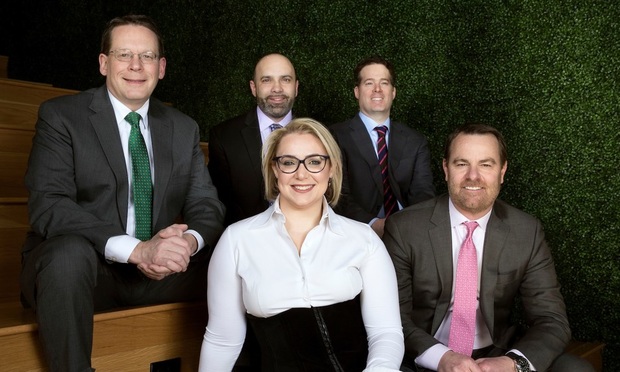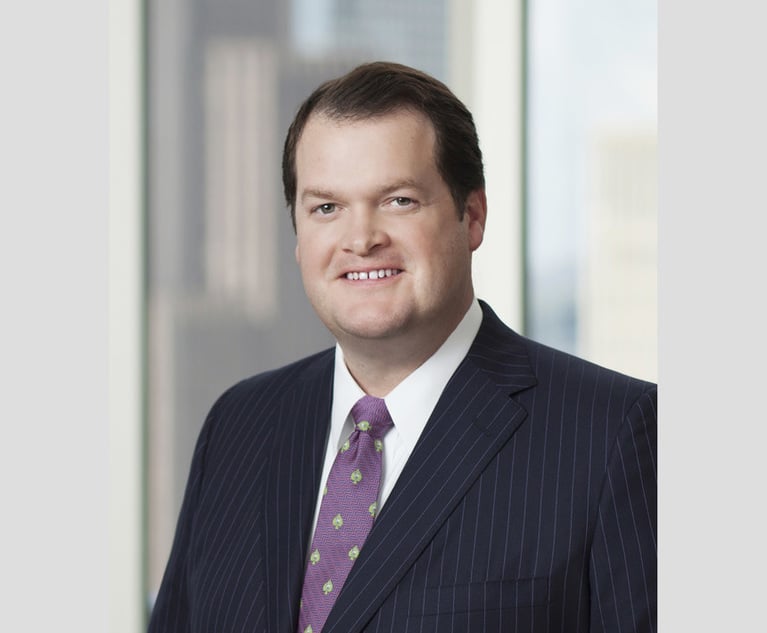First a Big Law Innovation, Then a Split
Two partners who helped create the Data Law Center have left Akerman, announcing last week the launch of a now eight-lawyer boutique in Chicago called Actuate Law that they said will be focused on building more expert systems without what they described as Big Law bureaucracy.
March 20, 2018 at 06:15 PM
5 minute read

Launched in 2015, the Akerman Data Law Center is a novel product from an Am Law 100 firm.
By combining research from Thomson Reuters Corp. and legal thinking from Akerman lawyers into software from Neota Logic Inc., the Data Law Center automates legal advice in the wake of a data breach. Clients pay a subscription fee for access to what some call a “legal expert system.”
When the Financial Times named former Akerman CEO Andrew Smulian in December as a Top 10 legal innovator for North America, in part thanks to the Data Law Center, Smulian pointed out that the advent of big data was “changing the way all lawyers practice law.”
Just maybe not fast enough.
Two partners who helped create the Data Law Center have left Akerman, announcing last week the launch of a now eight-lawyer boutique in Chicago called Actuate Law that they said will be focused on building more expert systems without what they described as Big Law bureaucracy.
“You have to invest in these types of things in order to win business in today's market,” said Martin Tully, one of five founders of Actuate Law and a former co-chairman of Akerman's data law practice involved in the development of the firm's Data Law Center. “We're not trying to convince some far-flung committee of the wisdom of this. We know it to be true.”
Jeffrey Sharer, the co-chairman of Akerman's data law practice who is widely credited with creating the Data Law Center, did not return a request for comment about his former colleagues.
In response to questions about ongoing plans to develop more products such as the Data Law Center, an Akerman spokesman said the firm believes innovation is a “business necessity” and that it provides “incentives and rewards” to professionals who spend time building products like the Data Law Center.
“We acknowledge that developing legal products in a professional services environment is challenging, but we are encouraged by our continued results,” the statement said. “We are solving complex client challenges in new ways, developing sophisticated tech-based legal products and continuously adapting our innovation platform. This platform provides the latitude necessary for our professionals to support these types of efforts and drives our firm to think beyond the traditional law firm model or billing structure.”
Despite its success as a new kind of legal product, Akerman's Data Law Center is not immune from some of the difficulties large law firms can have making upfront investments of lawyer time and money in products that may or may not pay off down the road. Few, if any, firms have designed robust systems to incentivize or reward work that is not based on the billable hour. That could hinder large firms from providing these types of new services.
Dara Tarkowski, another Akerman-turned-Actuate partner once involved in the Data Law Center, said expert systems are easier to develop inside a small firm.
The founders of Actuate Law were motivated to launch their firm in part by the success of the Akerman tool, Tarkowski said. In Tarkowski's practice counseling new financial services and technology firms, she said she saw plenty of opportunity—with up to 30 ideas—to create lower-cost solutions for startup companies to navigate complex regulatory environments.
As founders of a small firm, the new Actuate partners said they won't face some of the problems that can come with building products inside a larger firm where most partners are selling their time.
“As owners of the firm, we are taking the laboring oar to put our money where our mouths are,” Tarkowski said. “Martin and I don't have to worry about how we're going to figure out a way to compensate [other partners], because we're the people doing it. He and I, with the support of our partners, are the ones investing our time and committing our resources to do it because we believe in it.”
The five founders of Actuate Law first worked together at Katten Muchin Rosenman before Tarkowski, Tully and Douglas Albritton, a commercial litigator, joined Akerman's Chicago office in 2014. (Albritton had a stop at Reed Smith in the interim.) Two other founding partners, Charles Chejfec and Phil Tortorich, were partners at Katten until leaving for Actuate Law.
In addition to a focus on expert systems, the founders of Actuate Law said they offer more flexible billing arrangements than those often found in Big Law, including working with litigation finance firms to offer contingency fees. Actuate Law also rewards all of its lawyers, including associates and nonequity partners, with cash bonuses for originating new clients and work at the firm.
By being in a smaller firm, lawyers are free from rate pressure and client conflicts that had precluded them from working with a number of middle-market clients, Albritton said.
“We think Big Law will become increasingly hostile to the middle market,” added Albritton, “because Big Law likes to brag about how high their billing rates are and how high their profits per partner are. And that decimates the middle-market client that doesn't want to pay for that.”
This content has been archived. It is available through our partners, LexisNexis® and Bloomberg Law.
To view this content, please continue to their sites.
Not a Lexis Subscriber?
Subscribe Now
Not a Bloomberg Law Subscriber?
Subscribe Now
NOT FOR REPRINT
© 2025 ALM Global, LLC, All Rights Reserved. Request academic re-use from www.copyright.com. All other uses, submit a request to [email protected]. For more information visit Asset & Logo Licensing.
You Might Like
View All
Paul Hastings, Recruiting From Davis Polk, Adds Capital Markets Attorney
3 minute read
Goodwin Procter Relocates to Renewable-Powered Office in San Francisco’s Financial District


Greenberg Traurig Combines Digital Infrastructure and Real Estate Groups, Anticipating Uptick in Demand
4 minute readTrending Stories
- 1A Judge Is Raising Questions About Docket Rotation
- 2Eleven Attorneys General Say No to 'Unconstitutional' Hijacking of State, Local Law Enforcement
- 3Optimizing Legal Services: The Shift Toward Digital Document Centers
- 4Charlie Javice Fraud Trial Delayed as Judge Denies Motion to Sever
- 5Holland & Knight Hires Former Davis Wright Tremaine Managing Partner in Seattle
Who Got The Work
J. Brugh Lower of Gibbons has entered an appearance for industrial equipment supplier Devco Corporation in a pending trademark infringement lawsuit. The suit, accusing the defendant of selling knock-off Graco products, was filed Dec. 18 in New Jersey District Court by Rivkin Radler on behalf of Graco Inc. and Graco Minnesota. The case, assigned to U.S. District Judge Zahid N. Quraishi, is 3:24-cv-11294, Graco Inc. et al v. Devco Corporation.
Who Got The Work
Rebecca Maller-Stein and Kent A. Yalowitz of Arnold & Porter Kaye Scholer have entered their appearances for Hanaco Venture Capital and its executives, Lior Prosor and David Frankel, in a pending securities lawsuit. The action, filed on Dec. 24 in New York Southern District Court by Zell, Aron & Co. on behalf of Goldeneye Advisors, accuses the defendants of negligently and fraudulently managing the plaintiff's $1 million investment. The case, assigned to U.S. District Judge Vernon S. Broderick, is 1:24-cv-09918, Goldeneye Advisors, LLC v. Hanaco Venture Capital, Ltd. et al.
Who Got The Work
Attorneys from A&O Shearman has stepped in as defense counsel for Toronto-Dominion Bank and other defendants in a pending securities class action. The suit, filed Dec. 11 in New York Southern District Court by Bleichmar Fonti & Auld, accuses the defendants of concealing the bank's 'pervasive' deficiencies in regards to its compliance with the Bank Secrecy Act and the quality of its anti-money laundering controls. The case, assigned to U.S. District Judge Arun Subramanian, is 1:24-cv-09445, Gonzalez v. The Toronto-Dominion Bank et al.
Who Got The Work
Crown Castle International, a Pennsylvania company providing shared communications infrastructure, has turned to Luke D. Wolf of Gordon Rees Scully Mansukhani to fend off a pending breach-of-contract lawsuit. The court action, filed Nov. 25 in Michigan Eastern District Court by Hooper Hathaway PC on behalf of The Town Residences LLC, accuses Crown Castle of failing to transfer approximately $30,000 in utility payments from T-Mobile in breach of a roof-top lease and assignment agreement. The case, assigned to U.S. District Judge Susan K. Declercq, is 2:24-cv-13131, The Town Residences LLC v. T-Mobile US, Inc. et al.
Who Got The Work
Wilfred P. Coronato and Daniel M. Schwartz of McCarter & English have stepped in as defense counsel to Electrolux Home Products Inc. in a pending product liability lawsuit. The court action, filed Nov. 26 in New York Eastern District Court by Poulos Lopiccolo PC and Nagel Rice LLP on behalf of David Stern, alleges that the defendant's refrigerators’ drawers and shelving repeatedly break and fall apart within months after purchase. The case, assigned to U.S. District Judge Joan M. Azrack, is 2:24-cv-08204, Stern v. Electrolux Home Products, Inc.
Featured Firms
Law Offices of Gary Martin Hays & Associates, P.C.
(470) 294-1674
Law Offices of Mark E. Salomone
(857) 444-6468
Smith & Hassler
(713) 739-1250










